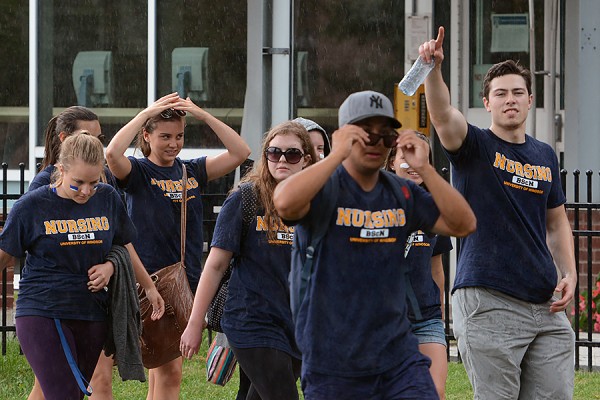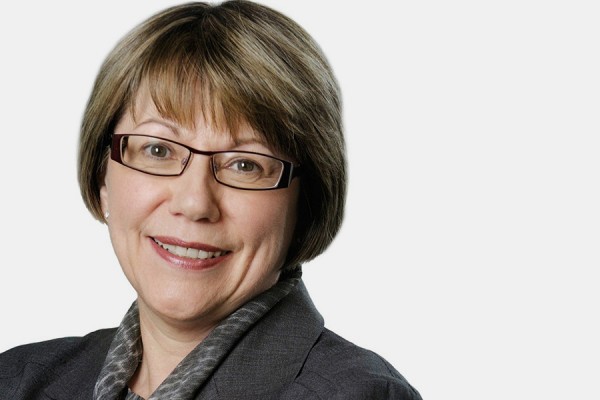 Michael Bell accepts an honorary degree from the University of Windsor at a reception Friday celebrating his Jerusalem Old City Initiative.
Michael Bell accepts an honorary degree from the University of Windsor at a reception Friday celebrating his Jerusalem Old City Initiative.
Adjunct professor and former Canadian ambassador Michael Bell was surprised with an honorary degree from the University of Windsor on Friday.
Bell was bestowed with a doctorate of laws by University of Windsor chancellor Ed Lumley at a private dinner on campus with friends, family and colleagues. It was the first time in memory the University has bestowed an honorary degree to a recipient outside a scheduled convocation.
The private dinner also served as an opportunity to celebrate the first of three books detailing the Jerusalem Old City Initiative (JOCI) that Dr. Bell helped co-found in 2003. It was under that pretense that he was surprised with the degree.
“It’s thrilling. Absolutely thrilling,” Bell, 73, said of the honour.
Bell’s ties to Windsor run deep, but it has been his actions across the globe that earned him public respect. After receiving his undergraduate and master’s degrees in political science from the University of Windsor, Bell joined the Canadian Foreign Service and held positions in Kingston, Jamaica; Port of Spain, Trinidad and Tobago; and Rome.
He then reached the highest pinnacle as a diplomat, serving for 16 years in the Middle East as Canada’s ambassador to Jordan, Egypt and twice to Israel.
“Bell has had an extraordinary career in international diplomacy for Canada,” said University of Windsor president Alan Wildeman. “It’s great to celebrate highly successful people, but it’s even greater when they are people who are from your own community.”
After 36 years of working in diplomacy, Bell made the transition to academia.
His first foray into research came at Harvard University’s Weatherhead Centre for International Affairs and later at the Munk School of Global Affairs.
“It was at the Munk Centre where he started thinking about what he wanted to do in his post-diplomatic life and began analyzing the complex problems of Jerusalem,” said long-time friend and colleague Tom Najem, an associate professor in the University of Windsor’s political science department.
Dr. Najem said it was around this time that he invited Bell to work at the University of Windsor as the Paul Martin Senior Scholar in International Diplomacy and embarked on a project that would soon marry his love of policy with academics.
Bell co-founded the Jerusalem Old City Initiative along with Michael Molloy, John Bell and Najem to develop creative options for the governance and management of the Old City of Jerusalem. The single issue of governing the Old City has been considered by many to be the main impediment to achieving peace between the Israeli and Palestinian governments.
Over the course of 10 years, members of the initiative met with prominent diplomats, policymakers, and influential personalities around the world and developed the Special Regime model which is still considered to be one of the most realistic options for the governance of the Old City.
The culmination of their work is being released this year in a series of three books by Routledge publishing.
“This initiative is the only study in existence that goes into the minutiae of zoning, public services, staffing, security and even archaeology,” Bell said. “(The initiative) will have a very long shelf life and will be a significant point of reference for anybody hoping to do something with Jerusalem.”
The first book, Track Two Diplomacy and Jerusalem: The Jerusalem Old City Initiative, was released in February and the following two will be released later this year.
If thoughts of the Middle East filled Bell’s head, it was the City of Windsor that flowed through his veins.
His great, great, great grandfather was soldier, prominent politician and businessman François Baby and his great, great grandfather was James Dougall. Dougall married Baby’s daughter and is credited for giving Windsor its name. Dougall Avenue is named after Bell’s ancestor and Victoria Avenue is named after Dougall’s daughter.
Bell’s maternal grandfather Urgel Jacques and his family are responsible for constructing many of the area’s most elegant buildings. Their names are attached to Ste. Anne’s Parish in Tecumseh, St. Joseph’s Roman Catholic Church in River Canard, St. Alphonsus Parish, the Eldorado and LaSalle apartments on Hanna Street as well as Dillon Hall at the University of Windsor.
The dinner on Friday featured many distinguished guests, including former Chief of Defence Staff and former Canadian ambassador to the U.S. John de Chastelain, and U.S. ambassador to Yemen and Director-General of the Egypt-Israel Multinational Force Arthur Hughes.
“(The honorary degree) is such an honour and a surprise,” Bell said. “It was so nice to be surrounded by colleagues both here at the University where I spent eight years teaching, and the JOCI team.
“It was really a surprise and so nice to see the kind of warmth that was demonstrated.”




